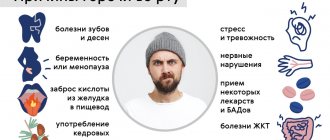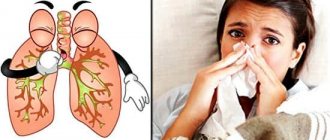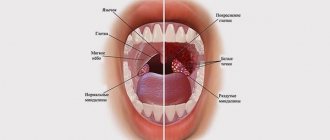Dry throat is one of the most unpleasant symptoms indicating diseases of the nasopharynx and sluggish painful processes inside the body. This is a fairly broad symptom that accompanies many diseases - from the common cold and ARVI to an acute allergic reaction or diabetes. Despite its apparent insignificance, a dry throat can be a marker indicating the presence of serious health problems. A patient suffering from a dry throat becomes more irritable and psychologically susceptible to pathogens, provoking the appearance of increasingly painful reactions.
Dry throat - symptoms of the phenomenon
Dry throat is a rather vague formulation; the main symptoms of this painful process can be several factors from this list:
- General feeling of fatigue, weakness.
- Hoarse voice, tension in the vocal cords.
- Pain in the throat muscles, worse when talking.
- A painful dry cough during which no mucus is coughed up.
- An increase in temperature due to the body's immune response.
- Enlarged tonsils and severe redness.
In addition, dry throat is often accompanied by symptoms that accompany a cold - such as a runny nose, swollen lymph nodes, and pronounced inflammatory processes.
The influence of nervous tension on the appearance of unpleasant symptoms in the esophagus
If such a symptom appears infrequently and is not associated with food intake, it can be assumed that the lump in the throat is caused by mental characteristics, in particular, a tendency to hysteria. With nervous tension associated with anxiety, excitement, or stress, a sensation of a lump appears closer to the pharynx in the area of the esophagus, which is usually called “hysterical”.
After a short period of time, everything usually goes away without any drug intervention or complications. Subsequently, in such cases, you can do several breathing exercises, massage the collar area, and take a mild sedative. Even a simple change of environment will help get rid of this symptom.
A lump in the esophagus may also be psychogenic in nature
From a physiological point of view, this reaction of the body is explained by the fact that during stress the body needs a large amount of oxygen. In this case, the glottis becomes so wide that it cannot be completely covered by the epiglottis. As a result, it is impossible to utter a word, swallow tears, or take a breath.
If the feeling of a coma in the esophagus is accompanied by panic attacks and mood swings, it is necessary to take sedatives, antidepressants, and consult a psychotherapist. The prerogative of a neurologist will be to treat a lump in the throat if it is accompanied by:
- Dizziness
- Nausea
- Apathy
- Increased sensitivity to weather fluctuations.
In this case, we are talking about vegetative-vascular dystonia, which has recently become the scourge of the modern city dweller. Dysfunction of the nervous system manifests itself in this way. If someone in the esophagus experiences pain between the ribs, which intensifies with exercise, as well as with inhalation and exhalation, we may be talking about intercostal neuralgia - inflammation of the nerve responsible for the innervation of the chest.
Dry throat due to bacterial infections
One of the most common causes of dry throat. Infectious diseases accompanied by fever, cough, runny nose and other unpleasant symptoms most often cause a feeling of dry mouth due to damage to the soft tissues of the oral mucosa. In this case, it is unnecessary to fight dry mouth - you need to eliminate the cause of the disease, not its symptoms. By focusing on fighting the infection with antibiotics and other medications, you will not only increase the body's resistance level, but also get rid of all unpleasant symptoms in one go.
Dry mouth in pregnant women
Not all pregnant women experience dry mouth while sleeping at night. Usually their salivary glands work more actively than in other periods. Therefore, dryness may indicate inflammatory processes in the body.
They are often caused by colds.
The situation of a pregnant woman may worsen if this symptom is supplemented by the appearance of a metallic taste in the mouth. If specific signs are detected, you should consult a specialist.
Dry mouth during pregnancy can occur due to frequent urination. The body simply does not have time to replenish its fluid reserves, so certain areas do not receive enough moisture.
Smoking
Unfortunately, despite numerous warnings from the Ministry of Health, there are still a lot of people who smoke in Russia. Over many years of addiction, they become accustomed not only to the dubious taste of tobacco, but also to the symptoms accompanying its use - a feeling of bitterness, cough, dry mouth. The complete disappearance of dry mouth in a smoking patient is almost impossible - constant inhalation of hot smoke dries out the mucous membrane and leads to the formation of dense lumps of mucus, making swallowing and breathing difficult. If the patient is not ready to give up a bad habit, but wants to get rid of an unpleasant symptom, tissue mineral therapy is carried out - the oral mucosa is moisturized and cleansed, accumulated sputum and mucus are dissolved and disinfected by medication, after which the patient experiences relief and is relieved for a while from a constant feeling of dryness in the throat.
Acute tonsillitis
Tonsillitis, or tonsillitis, is an infectious disease that results in acute inflammation of the tonsils. This is not only a very unpleasant disease in terms of its course, but also a very contagious phenomenon - you can get a sore throat simply by airborne droplets from any unsuccessful contact with an infected person. Inflammatory processes in the nasopharynx lead to severe dryness in the throat. As with colds, to get rid of a dry throat with a sore throat, you should treat the cause of the disease, not its symptom.
Diseases of the respiratory system.
Diseases of the respiratory system are a large group of diseases and conditions that can cause dry throat and require mandatory treatment under the supervision of an ENT doctor. Typically, such diseases are accompanied not only by dryness, but also by other symptoms: runny nose, frequent pain, cough and sore throat. If these symptoms appear, you should definitely contact an ENT doctor for an examination.
What diseases of the respiratory system cause dry throat?
- Acute respiratory viral infections, flu, colds. In addition to a dry throat, the patient has the following symptoms of colds and acute respiratory viral infections: fever, cough, nasal congestion, pain in muscles and joints, weakness, loss of appetite. Treatment is symptomatic: lowering the temperature, eliminating cough and runny nose with medications, as well as drinking plenty of warm fluids.
- Pharyngitis is an inflammation of the mucous membrane of the pharynx. Pharyngitis can be acute or chronic. Based on the nature of the changes in the mucous membrane, catarrhal pharyngitis is distinguished, when swelling of the tissues is observed, hypertrophic, when the mucous membrane thickens, and atrophic pharyngitis, when the mucous membrane, on the contrary, becomes thinner. Attacks of dry cough, red throat, discomfort during swallowing, sore throat - all these symptoms are signs of pharyngitis. Pharyngitis can simultaneously be paired with tonsillitis (inflammation of the tonsils) or laryngitis (inflammation of the larynx). In this case, the patient is diagnosed with tonsillopharyngitis and laryngopharyngitis. The patient is prescribed anti-inflammatory, antibacterial drugs, gargling, irrigation with antiseptics and physiotherapy (to consolidate the positive results from the action of the drugs and speed up the recovery process).
- Tonsillitis. The acute form of tonsillitis is called tonsillitis. If a sore throat is not treated in time, the disease will become chronic, with exacerbations occurring up to several times a year. Unlike pharyngitis, tonsillitis affects not the pharyngeal mucosa, but the palatine tonsils (tonsils). A sore throat occurs with acute pain in the throat, high body temperature, and a white coating or purulent accumulations appear on the tonsils. An effective means of combating sore throat is high-quality antibiotic therapy prescribed by an ENT doctor and physiotherapy performed in an ENT clinic. Chronic tonsillitis is not as severe as a sore throat, but its symptoms also cause the patient considerable discomfort: elevated body temperature, bad breath, sore throat. On the tonsils, purulent plugs are noticeable - accumulations of compressed streptococcus. Plugs support inflammation in the tonsils, so it is imperative to get rid of them. Effective therapy for chronic tonsillitis should be comprehensive and include treatment with medications, rinsing the tonsils from plugs and physiotherapy. In the absence of proper treatment, tonsillitis causes complications in the heart, kidneys and joints.
- Laryngitis is an inflammation of the larynx, which is accompanied not only by dryness, but also by severe itching, barking cough, hoarseness in the voice and itching in the throat, as if the throat is being “teared” from the inside. The treatment regimen for laryngitis includes taking antibacterial or antiviral agents, antiseptic drugs, antitussives, and physiotherapeutic procedures. Also, during treatment it is necessary to give up alcohol, smoking and avoid overstraining the vocal cords. Moisturizing and softening the throat is achieved by drinking plenty of fluids (herbal teas, fruit drinks, compotes, etc. are suitable)
- Pharyngomycosis (or fungal pharyngitis) is an inflammation of the pharyngeal mucosa, the causative agent of which is a fungal infection. Often the disease occurs due to uncontrolled use of antibiotics. The disease occurs with dryness, severe burning, discomfort and pain in the throat. A cheesy coating is noticeable on the mucous membrane of the throat. Therapy consists of taking antifungal, anti-inflammatory drugs, gargling and irrigating the throat with antiseptic drugs. Physiotherapy is an excellent addition to drug therapy.
Pharyngitis
Pharyngitis is an infectious disease that is accompanied by severe damage to the oral mucosa and lymph nodes. Rarely occurs alone - most often pharyngitis is accompanied by acute inflammatory processes. A patient suffering from pharyngitis is faced not only with a dry throat, but also with an unpleasant soreness and tickling, a sensation of a foreign element in the nasopharynx, as well as a general feeling of fatigue and malaise. Most often, to eliminate the unpleasant consequences of pharyngitis, they resort to complex treatment - simultaneously with the use of medications, the patient is prescribed mineral therapy to normalize the condition of the mucous membrane in the pharynx, which is supplemented by herbal medicine (the use of medicinal herbs and infusions to irrigate the affected area of the pharynx).
general characteristics
With insufficient salivation, constant dryness of the mucous membrane, burning and discomfort (burning mouth syndrome), and difficulty speaking are felt.
It becomes difficult for the patient to chew and swallow solid food. Some patients constantly drink water or use special formulations to maintain epithelial moisture. When examining the oral cavity, a small amount of viscous saliva, loss of shine and dryness of the mucous membrane are noted, and surface defects of the epithelium are detected. Saliva has trophic and protective properties for tooth enamel, so with xerostomia, teeth are affected by caries. The absence of lysozyme and nuclease causes a decrease in primary immune defense, which leads to candidiasis, manifested by a white coating on the epithelial membrane. Dryness and cracks in the lips are observed, and angular cheilitis often forms - long-term non-healing “jams” in the corners of the mouth. Elderly patients may complain of constant trauma to the mucous membrane when wearing prostheses.
Allergic reaction
An allergic reaction of varying severity is also often the cause of an unpleasant feeling of dryness in the throat. Associated symptoms include difficulty breathing, severe pain when swallowing or breathing, and many other signs. Since at this stage of development of medicine, allergies cannot be treated, but are chronic and haunt the patient throughout life, there are several ways to avoid dry mouth:
- Using antiallergic drugs to relieve allergic reactions.
- Integrated use of mineral therapy and herbal medicine to restore normal functioning of the throat.
- Exotic treatment methods for the restoration of mucous membranes in especially critical cases - laser therapy (in this case, a photosensitive gel is applied to the damaged tissues of the throat, which, under the influence of a laser, releases oxygen and saturates the soft tissues with it, promoting their regeneration and destroying pathogenic bacteria), ultrasound and other treatment methods .
Diagnostics
The main methods for diagnosing the disease are collecting anamnesis and performing pharyngoscopy. However, such a diagnosis is not enough to determine the cause of the pathology. After the diagnosis is made, the doctor refers the patient for examinations in order to identify the factors that led to the pathology. If you look at a photo of a sore throat with atrophied mucous membrane, it will help even a non-specialist to visually recognize the pathology in life.
Without fail, a person is sent for a consultation with a gastroenterologist, since it has been precisely proven that most of the atrophic pathologies of the pharyngeal mucosa develop due to the reflux of acid from the stomach into the esophagus. Sometimes the patient himself does not notice this problem, and only a specialist can determine it.
If no disorders of the gastrointestinal tract are established, a blood test for hormones and a smear to identify pathogenic microflora are indicated. In addition, a referral may be given for an allergy test.
When there is concern that the patient has begun to develop cancer, a biopsy of throat tissue is performed. It can be performed independently or in parallel with pharyngoscopy. Thanks to the procedure, a malignant process can often be detected at an early stage, when therapy is still possible.
Dry throat due to vascular pathologies
Diseases of the circulatory system and vascular pathologies are almost always accompanied by a painful feeling of dryness in the throat. In this case, the most acute symptom of the pathology is treated first. As soon as the danger to human life and health has disappeared, the attending physician can begin to get rid of dry throat. Most often, lymphotropic or capillary therapy is used for this. The essence of these methods is to normalize the functioning of capillaries that provide circulation of blood, lymph and nutrients in the damaged area of the throat. The body is saturated with useful substances, releasing large amounts of oxygen and ozone, which are destructive to most harmful bacteria. At the same time, the therapy is also of a general strengthening nature - it not only relieves the patient of the feeling of dry throat, but also prevents the appearance of similar symptoms for a long time, protecting soft mucous tissues from damage.
Differences from the subatrophic form
Subatrophic pharyngitis, the symptoms of which are minor, is the initial stage of atrophic pathology. There is no thinning or irreversible change in tissue yet. Subatrophic pharyngitis is dangerous because pronounced symptoms do not always appear, which is why many patients do not seek timely medical help. As a result, the start of therapy occurs at a time when the mucous membranes are already seriously damaged and cannot recover, and as a result, treatment is only supportive.
Disease prevention
Despite the fact that dry throat itself is not an independent disease (it is just a symptom), it can and should be avoided by promptly implementing a set of preventive measures to maintain the health of the oral mucosa. You can do this as follows:
- Do not neglect daily oral hygiene. When brushing your teeth and gargling, a person easily gets rid of many pathogenic bacteria, which can cause complications and even an infectious disease if not treated properly.
- Monitor the condition of the throat mucosa. If you observe the first signs of dryness or pain, immediately consult your doctor.
- Avoid unhealthy habits, particularly smoking. Stay outdoors more often; if you need to stay indoors for a long time with dry air, use a humidifier.
- Gargle regularly.
- Conduct herbal medicine at home - prepare plant decoctions and natural teas. They have a beneficial effect on the condition of the oral cavity, relieving a person of dry throat even in the bud of the disease.
Which doctor should I contact?
Dry throat is a fairly common symptom, so there is no clear answer to this question. It all depends on your individual clinical picture. However, if you are seriously concerned about a growing symptom and feel severe dryness in your throat, you should immediately visit an otolaryngologist, or ENT specialist - this is the specialist who deals with the treatment of the throat and will be able to advise you both on the treatment of dryness and on further medical specialist .
Dry throat is a dangerous symptom, without proper attention to which a person is recommended to face significant complications. At the first signs of dry throat, we recommend that you immediately consult your doctor to receive qualified medical care.
Call our contact center at 8 (495) 230 03 09 and we will help you make an appointment with a specialist!
Thyroid problems and esophageal conditions
Pathologies of the thyroid gland associated with its increased or decreased function (hypothyroidism and hyperthyroidism) can cause a feeling of a lump in the esophagus. If, at the same time as this symptom, you experience irritability, a feeling of chilliness, or, conversely, constant sweating, dry and brittle nails, hair, and memory impairment, you may need to consult an endocrinologist. Causes of thyroid dysfunction:
- Hormonal changes in the body.
- Iodine deficiency in food and drinking water.
- Metabolic disorders.
To clarify the diagnosis, you will have to do an ultrasound of the thyroid gland and donate blood for the presence of its hormones.









